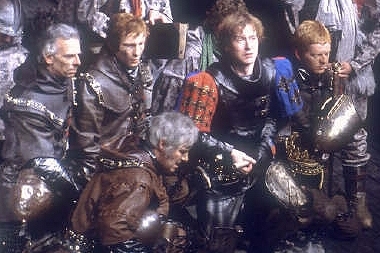|
New Yorkers are seeing only a third of the
Royal Shakespeare Company's triple production - the Henry V. In London
and Stratford-on-Avon, Mr Howard would sometimes do all three plays in one day
- including Henry IV, Part I and II. The effort has welded
him so literally into the role that, even at lunch in the staid and gray-haired
premises of the Gramercy Park Hotel, his Henry was fully with him: in the
groping, changeable, agonizing style, that is, in which he does the part, that
of a man putting a crown on, flinching, taking it off, examining it, putting it
back on at a different angle, pondering it, exercising it.
Take sardines. Mr. Howard, blond, pink-faced,
full of nerves and foggy with jet-lag, slow-marched over the menu. "How do you
prepare your sardines?" he asked the waiter at last.
"You take them out of a can," replied the
waiter who had come up five or six times to try to take the order. "You put
them on a lettuce leaf."
Mr. Howard regarded him suspiciously, peering
over his half-glasses. It was the identical look - and the same glasses that he
uses on stage, surrounded by bishops and nobles who all tell him that, of
course, he must invade France, while he worries about legitimacy and dead
bodies and the strength of his own character.
There is a faint defensiveness among the people
putting on this production of Henry V. Among the younger English - and
the Royal Shakespeare Company is mostly young - the play has jingoistic
overtones. To them it seems to contain - particularly in the traditional
interpretations - a flaunting of national grandeurs that no longer exist and
probably pretty immoral to start with.
Terry Hands, the director, and Mr. Howard have
seen in the play some very different possibilities, a way of working out on
stage the whole range of moral and psychological questions that arise when one
man is faced with the need to exercise power.
"We live in a beaurocratic time," Mr. Howard
said. "How long will people keep on saying, 'It's not my job, it's somebody
else's,' instead of , 'Ought I to be doing it myself?'
"Henry is frightened for himself and for his
people. And, you see, people in high positions are assumed to be iron
men.
"I doubt that they are," he continued, "in fact
I know they are not, and they ought not to be. Because that's the assumption
behind our lack of responsibility: that there's somebody tougher, higher up,
who knows how to make decisions."
With his Henry, Mr. Howard is acting out an
essay in how power is constructed out of an honorable hesitance. It is an idea
that troubles and fascinates him, and has been endlessly discussed among the
company members ever since they first began rehearsing.
Over this time, Mr. Howard's initial reserve
about the play has totally vanished.
"Shakespeare has been able to write not just
conventional comedy and tragedy, but with these plays he does what we would
call documentaries, and does them in a way that takes everybody into account.
I'm not talking about truthful history or accurate history, but the power to
convey persons in a rightly middle area."
After its run at the Brooklyn Academy of Music,
the company will take Henry V on a tour of Europe. Why didn't they visit
other American cities and why didn't they do Henry IV, Parts I
and II, as they have been doing in England?
The answer is money. Traveling for relatively
short runs to a number of American cities is expensive. And to bring the much
larger company needed for the three plays is even more expensive. This, even
though, to the actors' fury, they do not travel by scheduled flights, but are
wedged into tourist charters.
Richard Eder
New York Times, 23.4.1976.
|

